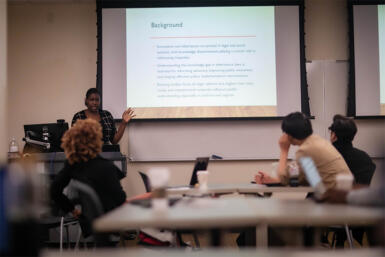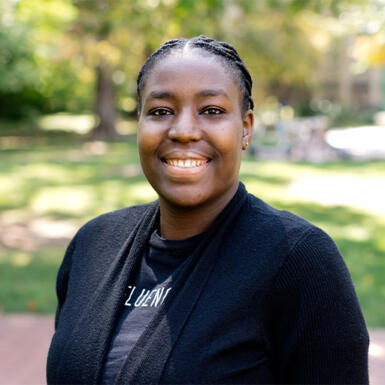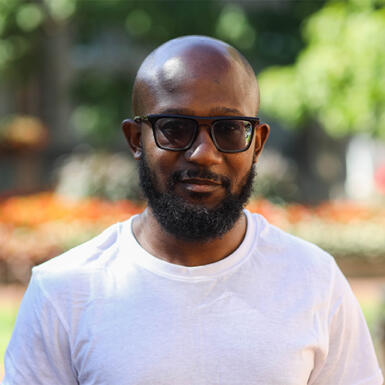Graduate students explore media usage and perception research funded by Kern Scholarships

The Media School has supported four graduate student research projects this year through the Kern Scholarship for Innovation in Journalism.
The Kern Scholarship provides up to $5,000 in financial support to Media School students for projects encouraging research and experimentation in new journalism concepts, content, and techniques. Both undergraduate and graduate students are eligible to apply.
This year’s Kern Scholarship recipients included graduate students Junghyun Moon, Trizah Ombewa, Caroline Obuya, and Jimmy Ochieng. Recipients came together April 4 to present their research. Here is a recap of their respective projects:
Polling Distrust in the Digital Age

By doctoral candidate Junghyun Moon
This research examines public distrust in opinion polling and growing political polarization. Although polls are central to democratic discourse, recent failures have fueled skepticism about their accuracy, methodology, and integrity. To address this, Moon developed and validated a multidimensional measure of polling distrust, reflecting negative expectations about poll believability, methodological soundness, and pollster benevolence.
Study 1 constructs and validates the measure. Study 2 investigates how polling distrust shapes responses to counter-attitudinal polling news — specifically, perceived self–public opinion incongruity, third-person perception, and willingness to share — and tests its moderating role in these effects.
Media Use and Knowledge Gao of Succession and Inheritance Laws in Kenya

By master’s student Trizah Ombewa
This study examines knowledge disparities in succession and inheritance laws among different demographic groups in Kenya, focusing on education, income, gender, and marital status. The study evaluates how various media formats shape public understanding of these laws and assesses the role of personal interactions in knowledge dissemination. Additionally, the study explores the perceived importance of succession and inheritance information and how it influences knowledge acquisition.
By applying the knowledge gap theory to legal awareness, this research expands its application beyond traditional domains such as politics and health. The findings will provide empirical evidence to inform policy interventions and targeted media strategies aimed at closing knowledge gaps. This study contributes to the limited body of research on knowledge disparities in Africa and offers insights that could guide future studies on media role and legal awareness initiatives in Kenya and beyond.
Representation of Single-Use Plastic Pollution in Kenyan Print Media
By master’s student Caroline Obuya
Despite global campaigns to curb plastic use, plastic pollution remains a pressing environmental challenge, with single-use plastic bags posing a particularly severe threat to marine ecosystems, soil quality, and overall biodiversity. Media coverage plays a crucial role in shaping public perception and policy responses to environmental issues.
This study examines how Kenyan print media frames the environmental impact of single-use plastic bags, focusing on coverage in two leading newspapers, the Daily Nation and The Standard, over a six-year period (August 2017–August 2023). The findings highlight gaps in media representation of plastic pollution, demonstrating that coverage often reacts to major environmental events rather than providing continuous in-depth analysis.
Africans perceptions of falsehoods in the Global North: Drivers of belief and engagement with conflict-related misinformation

By doctoral candidate Jimmy Ochieng
The abundance of crises in Africa, and the uncertainties they generate among the people of Africa, provide fertile ground for misinformation to thrive and spread. This project examines beliefs in and engagement with falsehoods among Kenyans and Ugandans about conflicts in Ukraine and Gaza. It draws on three theoretical frameworks to support an investigation of the factors that make Africans susceptible to falsehoods in periods of crises and uncertainties — media dependency theory, social identity theory (SIT) and motivated reasoning.
The data was collected via online surveys among Kenyans and Ugandans to test the explanatory power of 15 variables related to the media system, political system, and idiosyncratic characteristics of individuals to account for belief and willingness to share in falsehoods about foreign conflicts.

